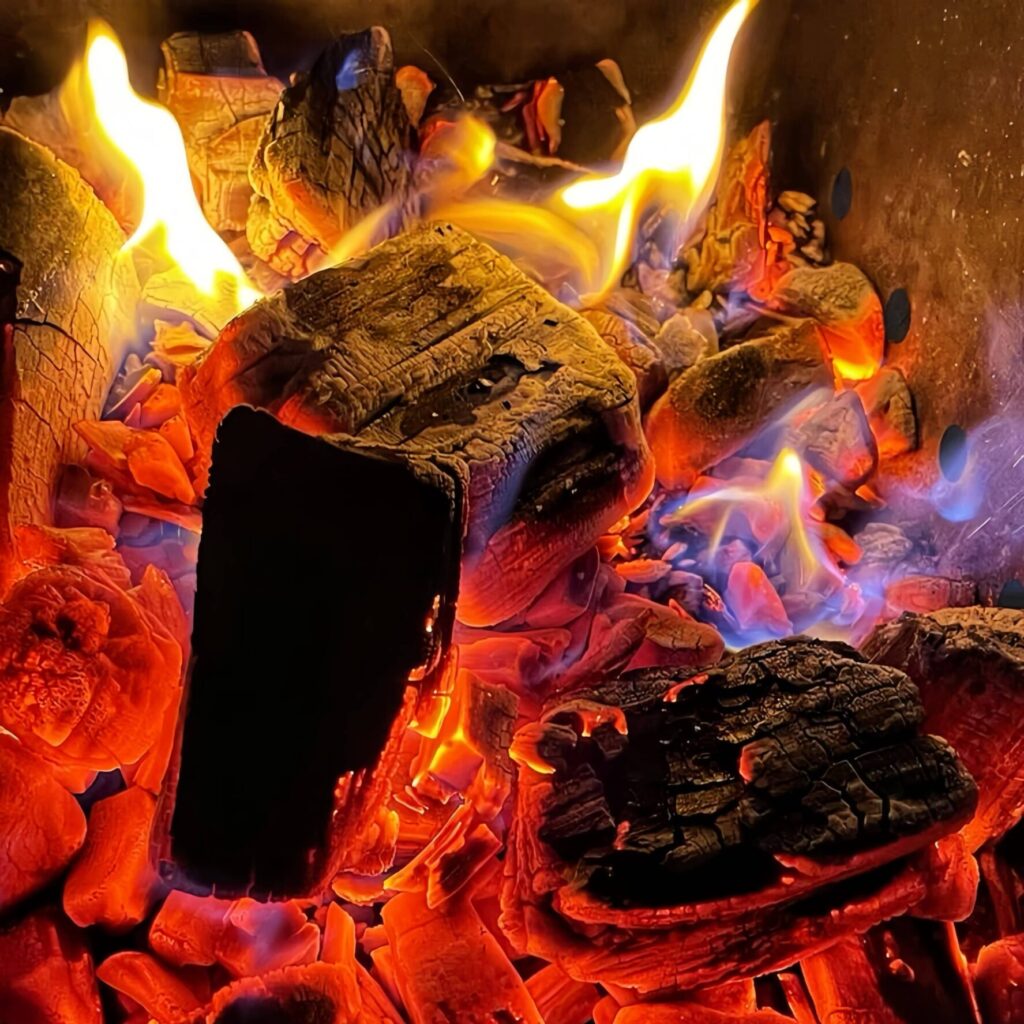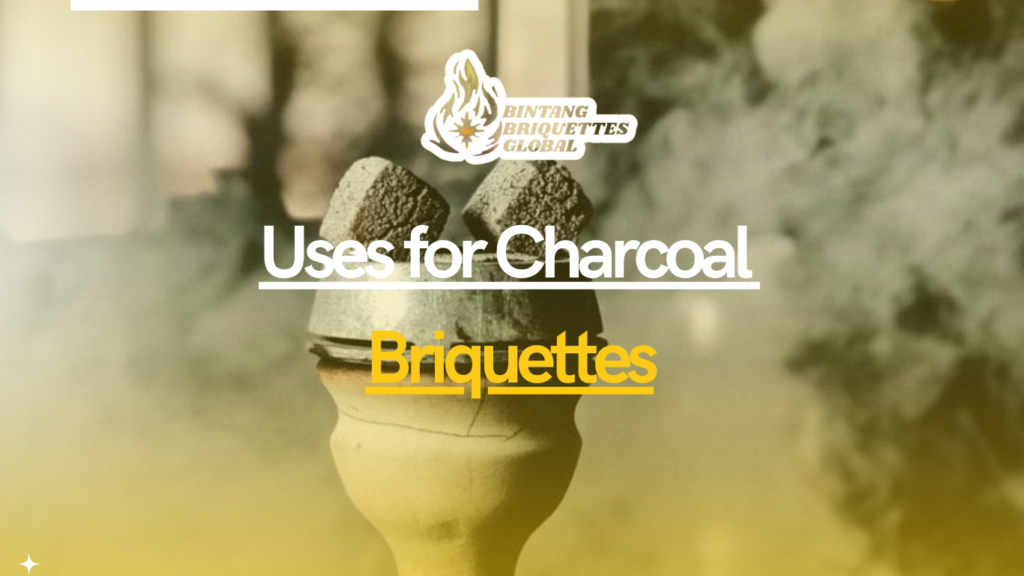Uses for charcoal briquettes are commonly associated with grilling and barbecuing, but their uses extend well beyond outdoor cooking. They offer practical applications in various aspects of life, from enhancing food flavor to solving household problems and even supporting industrial processes. In this article, we’ll explore the many benefits of charcoal briquettes, emphasizing their versatility and eco-friendly qualities.

Common Uses for Charcoal Briquettes in Grilling and Barbecuing
Read more history-of-charcoal-briquettes
Charcoal briquettes are essential for outdoor cooking, providing steady heat and a smoky flavor that enhance grilled meals.
Consistent Heat for Perfect Grilling
Grilling with charcoal briquettes ensures a stable cooking temperature. The briquettes burn consistently for hours, helping you cook food evenly. This is especially important when grilling thick cuts of meat, as it allows for a well-done exterior and a tender, juicy interior.
Smoky Flavor
Briquettes made from hardwoods like hickory or mesquite add a unique smoky flavor to your grilled food. The slow combustion process imparts a deep, rich flavor, which is why many people prefer using briquettes over other fuels.
Easy to Use
Compared to lump charcoal, briquettes are more convenient to use and control.Their uniform shape ensures an even burn, which helps even beginners enjoy consistent cooking results. The predictable burn rate also reduces the need for frequent adjustments, making grilling less stressful.
Uses for Charcoal Briquettes Versatility in Cooking Methods
Charcoal briquettes are not just for direct grilling. You can also use them for indirect cooking or slow smoking. Their long burn time allows for slow cooking, ideal for tenderizing meat or creating smoked dishes. With the ability to create different heat zones on your grill, briquettes offer versatility in cooking techniques.
In short, charcoal briquettes offer reliable heat, smoky flavor, and flexibility, making them indispensable for grilling and barbecuing.
How Charcoal Briquettes Enhance Smoking Meat and Fish
Smoking meat or fish requires a low, consistent heat source, and charcoal briquettes are well-suited for this purpose.
Low and Slow Cooking
The low, steady heat from briquettes is perfect for smoking. This method allows your food to cook slowly at temperatures between 180°F and 250°F, ensuring that it remains moist and flavorful while absorbing the smoky aroma.
Even Heat Distribution
Charcoal briquettes provide uniform heat, ensuring that your meat cooks evenly throughout. This even distribution is crucial when smoking larger cuts of meat or fish. The briquettes’ consistent burn eliminates the risk of hot spots, giving you more control over your cooking.
Moisture Retention
During the smoking process, it’s important to maintain moisture, especially when smoking meats like brisket or chicken. Briquettes, when used with water pans, help lock in moisture, ensuring that your food remains tender and juicy.
Flavor Enhancement
Different types of charcoal briquettes, like those made from fruitwoods, can add unique flavors to your food. By choosing the right briquettes, you can customize the flavor profile of your smoked dishes, giving them a distinct taste that enhances the overall experience.
Uses for Charcoal Briquettes Extended Cooking Sessions
Smoking meat often requires long hours of low-temperature cooking. Charcoal briquettes burn longer than other fuels, which means you don’t need to add more charcoal frequently. This convenience allows you to focus on your food without worrying about constant refueling.
Overall, charcoal briquettes are perfect for smoking. They provide even heat, moisture retention, and flavorful results, making them a top choice for smoking meat and fish.
Eco-Friendly Uses for Charcoal Briquettes in Outdoor Activities
Charcoal briquettes are not only great for grilling—they can also serve multiple eco-friendly purposes in outdoor settings.
Charcoal for Campfires
Charcoal briquettes are a great alternative to firewood for campfires. They burn longer and produce less smoke, making them ideal for camping trips. Their compact size also makes them easy to pack and carry, making them a more practical option than traditional firewood.
Uses for Charcoal Briquettes Camping Stove Fuel
Portable camping stoves often use charcoal briquettes as a fuel source. Their compactness and efficient burn rate make them perfect for cooking meals while camping. Additionally, charcoal produces fewer harmful emissions than other fuels, making it a safer and more eco-friendly option for outdoor cooking.
Improving Soil Health
Crushed charcoal briquettes can be mixed into soil to improve its health. They help retain moisture, improve nutrient availability, and promote better root growth. Charcoal can also balance soil pH and provide a favorable environment for beneficial microorganisms. This makes it especially useful for gardeners in dry climates.
Natural Water Filtration
Charcoal briquettes, when crushed, can act as a filter for purifying water. They help remove impurities, chemicals, and toxins, making water safer for consumption. This is especially valuable for survivalists or campers who need to purify water in an emergency.
Insect Repellent
Burning charcoal briquettes can also help keep pests away. The smoke produced by charcoal acts as a natural deterrent for insects like mosquitoes. This makes charcoal an excellent choice for keeping bugs at bay during outdoor activities or camping trips.
Charcoal’s eco-friendly applications in outdoor activities demonstrate its versatility and sustainability.
Uses for Charcoal Briquettes in Emergency Heating Solutions
Charcoal briquettes can also be used as a temporary heat source in emergency situations, such as during power outages or heating system failures.
Portable Heaters
Some portable emergency heaters are designed to safely burn charcoal briquettes. These heaters can provide warmth in small spaces during power outages. It’s crucial, however, to use them in well-ventilated areas to prevent the buildup of dangerous gases like carbon monoxide.
Uses for Charcoal Briquettes Heating Small Spaces
Charcoal briquettes can also be used in small, enclosed spaces like tents or cabins for temporary heating. Their long burn time makes them suitable for keeping these areas warm during cold weather. Always make sure there is adequate ventilation to prevent carbon monoxide poisoning.
Safety Considerations
Safety should always be a top priority when using charcoal for heating.
Never burn charcoal inside or in areas without proper ventilation. Always monitor the fire and ensure that the area is well-ventilated to reduce the risk of carbon monoxide buildup.
Uses for Charcoal Briquettes for Odor Absorption and Freshening
Charcoal briquettes are natural odor absorbers, making them a great solution for freshening up various spaces around the house.
Deodorizing Closets and Shoes
Placing a few charcoal briquettes in closets or shoe racks helps absorb moisture and unpleasant odors. This is particularly useful in damp areas like basements, where odors and mold can accumulate. The charcoal naturally draws in moisture and neutralizes the smells, keeping these areas fresh.
Fridge and Freezer Freshening
Charcoal briquettes can also help eliminate food odors in refrigerators and freezers. Simply place a few briquettes inside, and they will absorb any unwanted smells. This is a natural and chemical-free way to keep your food storage areas clean and odor-free.
Car Fresheners
Charcoal briquettes can be used as air fresheners in cars. They are effective at absorbing food smells, pet odors, and smoke. Additionally, charcoal helps reduce moisture in the vehicle, preventing mold growth and keeping the air inside your car fresh.
Using charcoal briquettes for deodorizing and freshening is a cost-effective, natural alternative to commercial air fresheners.
Industrial and Commercial Uses of Charcoal Briquettes
Charcoal briquettes play a key role in various industrial processes, ranging from energy production to metallurgy.
Metallurgical Industry
In the production of steel and other metals, charcoal is used as a reducing agent. It is also burned in blast furnaces to generate the high temperatures needed to smelt and refine ores. The purity and heat resistance of charcoal make it an ideal fuel for these industrial processes.
Activated Carbon Production
Charcoal briquettes are an important raw material for producing activated carbon, which is used in water purification, air filtration, and industrial applications. Activated carbon is highly effective at adsorbing pollutants, toxins, and contaminants from liquids and gases.
Fuel for Industrial Boilers
Charcoal briquettes are also used as an alternative fuel in industrial boilers and furnaces. Their high energy output and consistent burn make them a reliable and efficient energy source for manufacturing and processing plants. Charcoal is a cleaner, renewable option that helps reduce dependence on fossil fuels.
Charcoal’s applications in industrial processes highlight its versatility and importance in various sectors.
Uses for Charcoal Briquettes as an Alternative to Firewood
Charcoal briquettes are becoming a preferred alternative to firewood for heating and cooking.
Uses for Charcoal Briquettes Longer Burn Time and Higher Heat Output
Charcoal briquettes burn longer and produce more heat than firewood. This makes them ideal for long-duration heating and cooking. Their consistent burn rate also reduces the need for constant attention, unlike firewood, which often requires frequent refueling.
Cleaner Burning with Less Smoke
Charcoal produces far less smoke than firewood, which is a major advantage for those concerned about air quality. Burning charcoal is a cleaner process, making it better for indoor use and in areas where air pollution is a concern.
Easier Storage and Transport
Charcoal briquettes are easier to store and transport compared to firewood. Their compact size makes them ideal for people with limited storage space, while their lightweight nature makes them easy to carry.
Uses for Charcoal Briquettes Sustainability
Using charcoal briquettes helps reduce the demand for firewood, which contributes to deforestation. Many briquettes are made from recycled wood or agricultural by-products, making them a more sustainable fuel option than traditional firewood.
Conclusion
Charcoal briquettes are far more than just a grilling tool. Their versatility extends across cooking, household maintenance, pest control, and even industrial applications. From enhancing food flavors to purifying water, they play an essential role in everyday life and can contribute to a more sustainable lifestyle. By using charcoal responsibly, you can enjoy its many benefits while minimizing its environmental impact.

